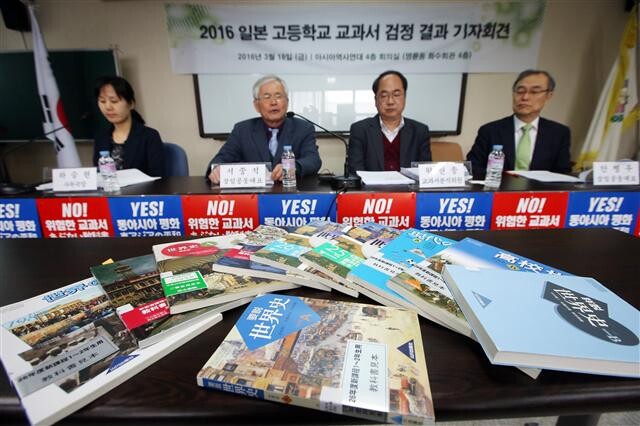hankyoreh
Links to other country sites 다른 나라 사이트 링크
[Editorial] Japanese textbooks are the Abe government’s latest historical distortions

On Mar. 18, the Japanese government announced that it had authorized textbooks for the first and second years of high school. These textbooks distort historical events and further emphasize Japan’s territorial claims to Dokdo, an island that the Japanese call Takeshima.
These textbooks betray Japan’s audacious disregard for the facts of history, as well as for its relationship with its neighbor, Korea. We call on the Japanese government to retract this decision.
This round of textbook assessment thoroughly reflected the viewpoint of the Japanese right wing. As a consequence, 27 of 35 textbooks (77%) for high school social studies classes contain phrases like “Takeshima is Japanese sovereign territory” and “the island is illegally controlled by South Korea.”
The textbooks’ descriptions of the so-called comfort women for the Imperial Japanese Army water down the truth; their descriptions of the Kanto Earthquake and the March 1 Independence Movement are ambiguous about the number of Koreans who were slaughtered during these events.
The textbooks also state that Japan dealt with postwar reparations through treaties with individual states and that the government cannot provide compensation to individuals.
This outcome is similar to when the Japanese government assessed middle school and elementary school textbooks in 2014 and 2015. Now, all Japanese students will learn a distorted view of history and Japan’s incorrect territorial claims to Dokdo in the classroom.
This is the result of persistent efforts by the Japanese right wing, which is represented by the administration of Prime Minister Shinzo Abe.
Abe has played a leading role in changing Japan’s textbooks for the worse. During his first term in office in 2006, he revised the basic education act for the first time in decades; when he returned to power at the end of 2012, he altered the textbook assessment standards and teacher’s handbooks in line with right-wing values.
The current batch of textbooks represents the fruition of these plans.
The South Korean government is partly to blame for Japan’s textbooks getting this bad. In particular, the administrations of current president Park Geun-hye and her predecessor Lee Myung-bak (2008-2013) have exacerbated the situation by ricocheting from one approach to the other instead of firmly holding to set principles.
That vacillation culminated in the settlement reached on Dec. 28, which appeared to absolve Japan for the comfort women system.
The only thing achieved by Lee’s abrupt visit to Dokdo in Aug. 2012 was provoking Japan. The Park administration’s unilateral push to monopolize production of Korean history textbooks is also sure to undermine Seoul’s credibility on the textbook issue.
In the past, Japan’s right wing committed unpardonable crimes against a number of Asian countries. Now, it is trying to impose its worldview on young students.
This is an attempt to buck the trend not only in Japan’s relations with South Korea but also in world history. Even now, we are calling on the Abe administration to squarely face up to history.
Please direct questions or comments to [english@hani.co.kr]

Editorial・opinion
![[Column] Season 2 of special prosecutor probe may be coming to Korea soon [Column] Season 2 of special prosecutor probe may be coming to Korea soon](https://flexible.img.hani.co.kr/flexible/normal/500/300/imgdb/original/2024/0426/3317141030699447.jpg) [Column] Season 2 of special prosecutor probe may be coming to Korea soon
[Column] Season 2 of special prosecutor probe may be coming to Korea soon![[Column] Park Geun-hye déjà vu in Yoon Suk-yeol [Column] Park Geun-hye déjà vu in Yoon Suk-yeol](https://flexible.img.hani.co.kr/flexible/normal/500/300/imgdb/original/2024/0424/651713945113788.jpg) [Column] Park Geun-hye déjà vu in Yoon Suk-yeol
[Column] Park Geun-hye déjà vu in Yoon Suk-yeol- [Editorial] New weight of N. Korea’s nuclear threats makes dialogue all the more urgent
- [Guest essay] The real reason Korea’s new right wants to dub Rhee a founding father
- [Column] ‘Choson’: Is it time we start referring to N. Korea in its own terms?
- [Editorial] Japan’s rewriting of history with Korea has gone too far
- [Column] The president’s questionable capacity for dialogue
- [Column] Are chaebol firms just pizza pies for families to divvy up as they please?
- [Column] Has Korea, too, crossed the Rubicon on China?
- [Correspondent’s column] In Japan’s alliance with US, echoes of its past alliances with UK
Most viewed articles
- 1Samsung subcontractor worker commits suicide from work stress
- 2‘We must say no’: Seoul defense chief on Korean, USFK involvement in hypothetical Taiwan crisis
- 3Is Japan about to snatch control of Line messenger from Korea’s Naver?
- 4Division commander ordered troops to enter raging flood waters before Marine died, survivor says
- 5[Editorial] Korea’s surprise Q1 growth requires objective assessment, not blind fanfare
- 6No good, very bad game for Korea puts it out of Olympics for first time since 1988
- 7US overtakes China as Korea’s top export market, prompting trade sanction jitters
- 8Korea’s 1.3% growth in Q1 signals ‘textbook’ return to growth, says government
- 9N. Korean delegation’s trip to Iran shows how Pyongyang is leveraging ties with Moscow
- 10[Column] Season 2 of special prosecutor probe may be coming to Korea soon